A fibonacci heap is a tree based data structure which consists of a collection of trees with min heap or max heap property. Its operations are more efficient in terms of time complexity than those of its similar data structures like binomial heap and binary heap.
Now, we will discuss two of its important operations.
- Decrease a key: decreases the value of a the key to any lower value
- Delete a node: deletes the given node
Decreasing a Key
In decreasing a key operation, the value of a key is decreased to a lower value.
Following functions are used for decreasing the key.
Decrease-Key
- Select the node to be decreased, x, and change its value to the new value k.
- If the parent of x, y, is not null and the key of parent is greater than that of the k then call
Cut(x)andCascading-Cut(y)subsequently. - If the key of x is smaller than the key of min, then mark x as min.
Cut
- Remove x from the current position and add it to the root list.
- If x is marked, then mark it as false.
Cascading-Cut
- If the parent of y is not null then follow the following steps.
- If y is unmarked, then mark y.
- Else, call
Cut(y)andCascading-Cut(parent of y).
Decrease Key Example
The above operations can be understood in the examples below.
Example: Decreasing 46 to 15.
- Decrease the value 46 to 15.

Decrease 46 to 15 - Cut part: Since
24 ≠ nilland15 < its parent, cut it and add it to the root list. Cascading-Cut part: mark 24.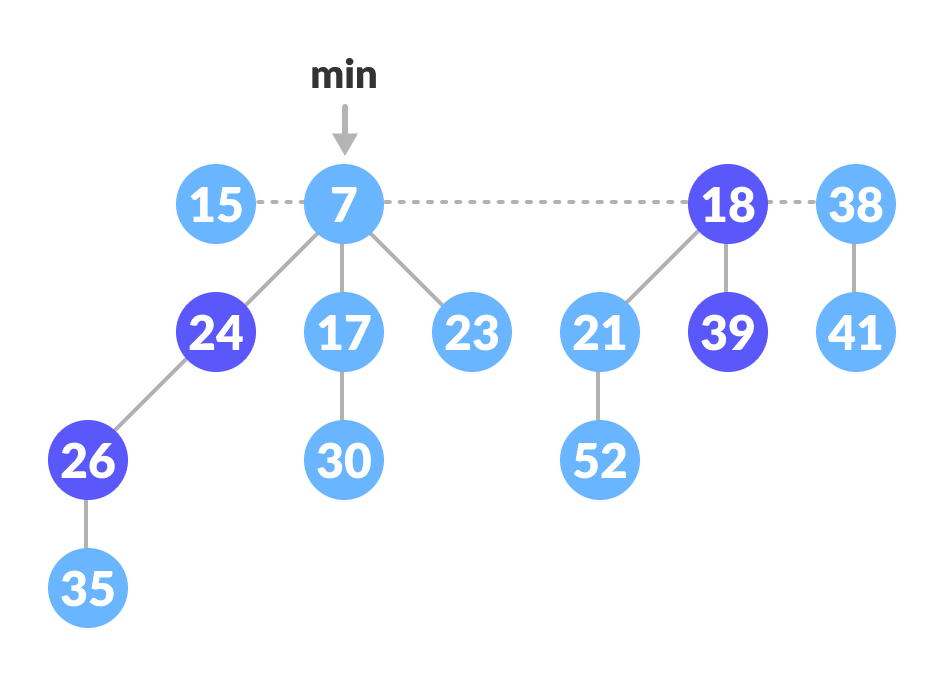
Add 15 to root list and mark 24
Example: Decreasing 35 to 5
- Decrease the value 35 to 5.

Decrease 35 to 5 - Cut part: Since
26 ≠ nilland5<its parent, cut it and add it to the root list.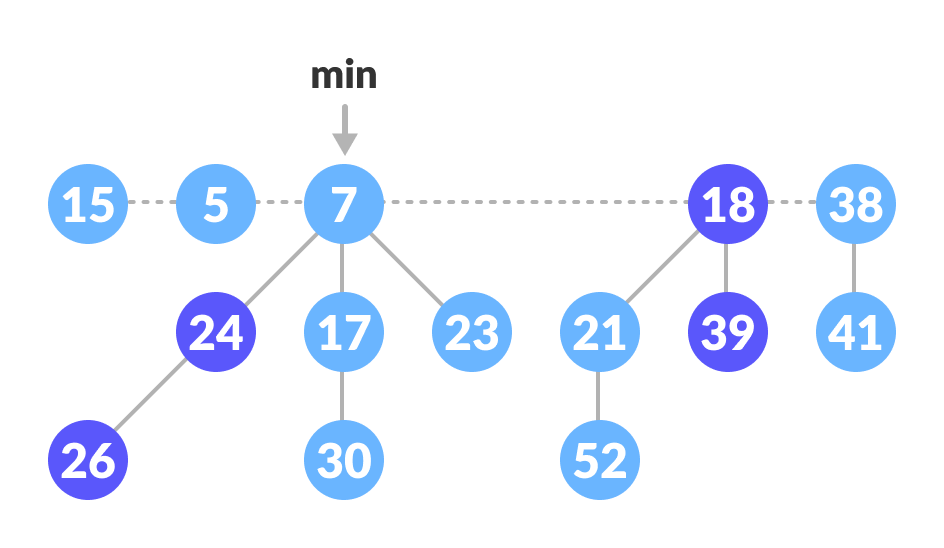
Cut 5 and add it to root list - Cascading-Cut part: Since 26 is marked, the flow goes to
CutandCascading-Cut.
Cut(26): Cut 26 and add it to the root list and mark it as false.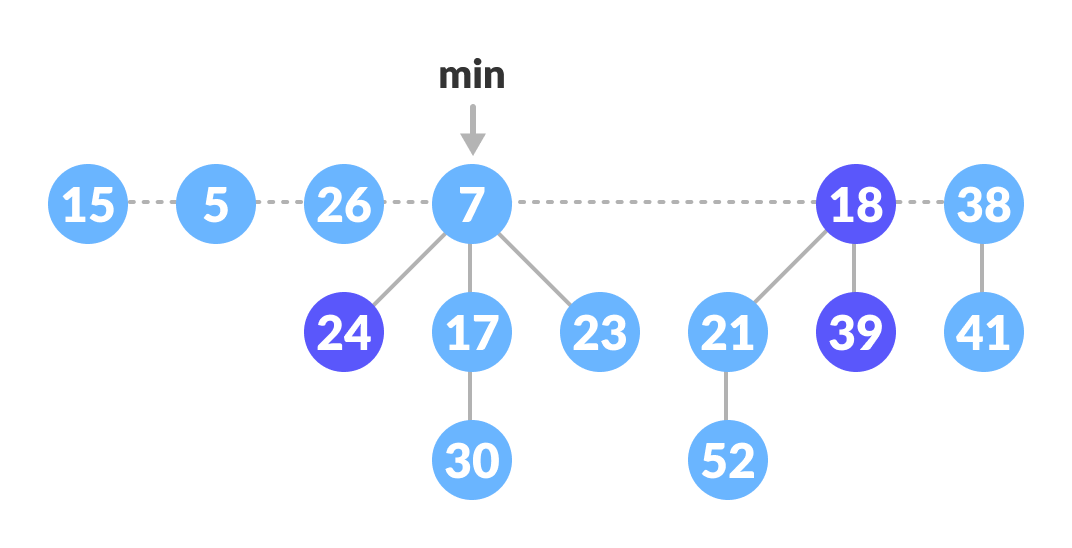
Cut 26 and add it to root list
Cascading-Cut(24):
Since the 24 is also marked, again callCut(24)andCascading-Cut(7). These operations result in the tree below.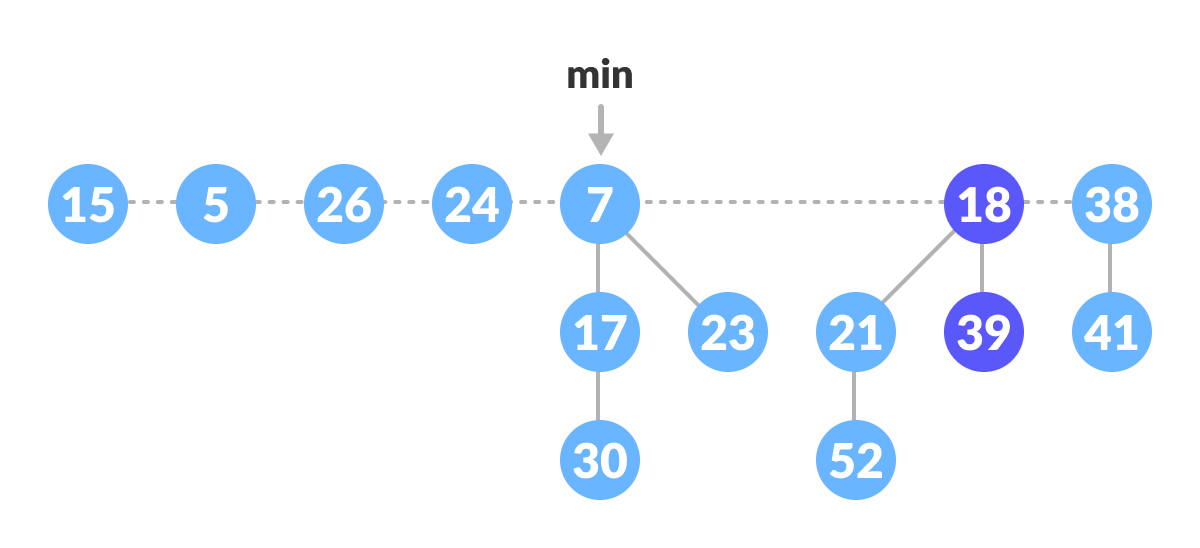
Cut 24 and add it to root list - Since
5 < 7, mark 5 as min.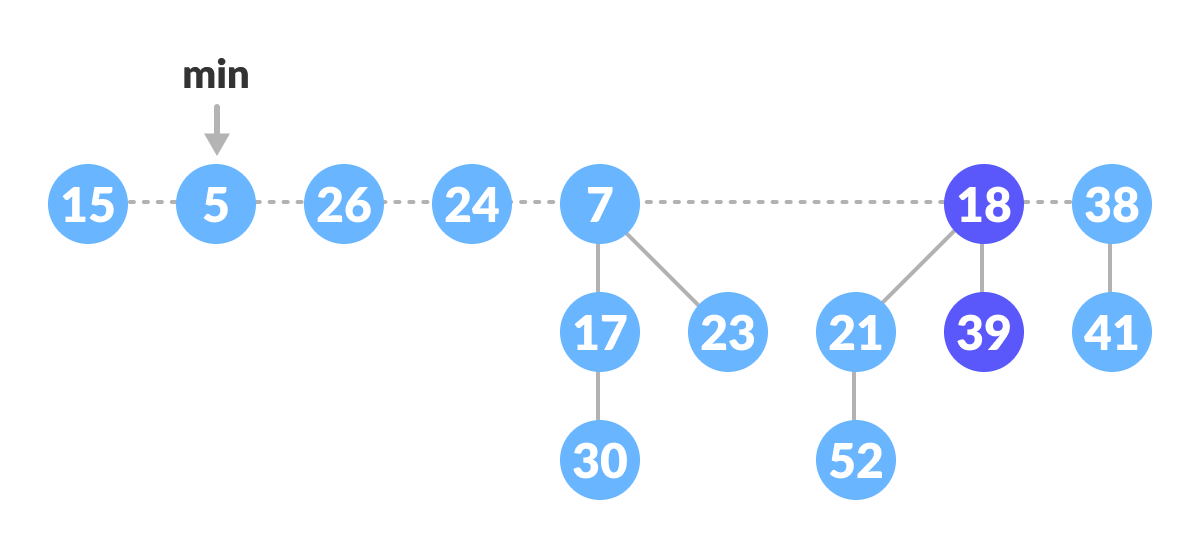
Mark 5 as min
Deleting a Node
This process makes use of decrease-key and extract-min operations. The following steps are followed for deleting a node.
- Let k be the node to be deleted.
- Apply decrease-key operation to decrease the value of k to the lowest possible value (i.e. -∞).
- Apply extract-min operation to remove this node.
Decrease key and Delete node operations in Python, Java and C/C++
# Fibonacci Heap in python
import math
class FibonacciTree:
def __init__(self, key):
self.key = key
self.children = []
self.order = 0
def add_at_end(self, t):
self.children.append(t)
self.order = self.order + 1
class FibonacciHeap:
def __init__(self):
self.trees = []
self.least = None
self.count = 0
def insert(self, key):
new_tree = FibonacciTree(key)
self.trees.append(new_tree)
if (self.least is None or key < self.least.key):
self.least = new_tree
self.count = self.count + 1
def get_min(self):
if self.least is None:
return None
return self.least.key
def extract_min(self):
smallest = self.least
if smallest is not None:
for child in smallest.children:
self.trees.append(child)
self.trees.remove(smallest)
if self.trees == []:
self.least = None
else:
self.least = self.trees[0]
self.consolidate()
self.count = self.count - 1
return smallest.key
def consolidate(self):
aux = (floor_log2(self.count) + 1) * [None]
while self.trees != []:
x = self.trees[0]
order = x.order
self.trees.remove(x)
while aux[order] is not None:
y = aux[order]
if x.key > y.key:
x, y = y, x
x.add_at_end(y)
aux[order] = None
order = order + 1
aux[order] = x
self.least = None
for k in aux:
if k is not None:
self.trees.append(k)
if (self.least is None
or k.key < self.least.key):
self.least = k
def floor_log2(x):
return math.frexp(x)[1] - 1
fheap = FibonacciHeap()
fheap.insert(11)
fheap.insert(10)
fheap.insert(39)
fheap.insert(26)
fheap.insert(24)
print('Minimum value: {}'.format(fheap.get_min()))
print('Minimum value removed: {}'.format(fheap.extract_min()))
// Operations on Fibonacci Heap in Java
class node {
node parent;
node left;
node right;
node child;
int degree;
boolean mark;
int key;
public node() {
this.degree = 0;
this.mark = false;
this.parent = null;
this.left = this;
this.right = this;
this.child = null;
this.key = Integer.MAX_VALUE;
}
node(int x) {
this();
this.key = x;
}
void set_parent(node x) {
this.parent = x;
}
node get_parent() {
return this.parent;
}
void set_left(node x) {
this.left = x;
}
node get_left() {
return this.left;
}
void set_right(node x) {
this.right = x;
}
node get_right() {
return this.right;
}
void set_child(node x) {
this.child = x;
}
node get_child() {
return this.child;
}
void set_degree(int x) {
this.degree = x;
}
int get_degree() {
return this.degree;
}
void set_mark(boolean m) {
this.mark = m;
}
boolean get_mark() {
return this.mark;
}
void set_key(int x) {
this.key = x;
}
int get_key() {
return this.key;
}
}
public class fibHeap {
node min;
int n;
boolean trace;
node found;
public boolean get_trace() {
return trace;
}
public void set_trace(boolean t) {
this.trace = t;
}
public static fibHeap create_heap() {
return new fibHeap();
}
fibHeap() {
min = null;
n = 0;
trace = false;
}
private void insert(node x) {
if (min == null) {
min = x;
x.set_left(min);
x.set_right(min);
} else {
x.set_right(min);
x.set_left(min.get_left());
min.get_left().set_right(x);
min.set_left(x);
if (x.get_key() < min.get_key())
min = x;
}
n += 1;
}
public void insert(int key) {
insert(new node(key));
}
public void display() {
display(min);
System.out.println();
}
private void display(node c) {
System.out.print("(");
if (c == null) {
System.out.print(")");
return;
} else {
node temp = c;
do {
System.out.print(temp.get_key());
node k = temp.get_child();
display(k);
System.out.print("->");
temp = temp.get_right();
} while (temp != c);
System.out.print(")");
}
}
public static void merge_heap(fibHeap H1, fibHeap H2, fibHeap H3) {
H3.min = H1.min;
if (H1.min != null && H2.min != null) {
node t1 = H1.min.get_left();
node t2 = H2.min.get_left();
H1.min.set_left(t2);
t1.set_right(H2.min);
H2.min.set_left(t1);
t2.set_right(H1.min);
}
if (H1.min == null || (H2.min != null && H2.min.get_key() < H1.min.get_key()))
H3.min = H2.min;
H3.n = H1.n + H2.n;
}
public int find_min() {
return this.min.get_key();
}
private void display_node(node z) {
System.out.println("right: " + ((z.get_right() == null) ? "-1" : z.get_right().get_key()));
System.out.println("left: " + ((z.get_left() == null) ? "-1" : z.get_left().get_key()));
System.out.println("child: " + ((z.get_child() == null) ? "-1" : z.get_child().get_key()));
System.out.println("degree " + z.get_degree());
}
public int extract_min() {
node z = this.min;
if (z != null) {
node c = z.get_child();
node k = c, p;
if (c != null) {
do {
p = c.get_right();
insert(c);
c.set_parent(null);
c = p;
} while (c != null && c != k);
}
z.get_left().set_right(z.get_right());
z.get_right().set_left(z.get_left());
z.set_child(null);
if (z == z.get_right())
this.min = null;
else {
this.min = z.get_right();
this.consolidate();
}
this.n -= 1;
return z.get_key();
}
return Integer.MAX_VALUE;
}
public void consolidate() {
double phi = (1 + Math.sqrt(5)) / 2;
int Dofn = (int) (Math.log(this.n) / Math.log(phi));
node[] A = new node[Dofn + 1];
for (int i = 0; i <= Dofn; ++i)
A[i] = null;
node w = min;
if (w != null) {
node check = min;
do {
node x = w;
int d = x.get_degree();
while (A[d] != null) {
node y = A[d];
if (x.get_key() > y.get_key()) {
node temp = x;
x = y;
y = temp;
w = x;
}
fib_heap_link(y, x);
check = x;
A[d] = null;
d += 1;
}
A[d] = x;
w = w.get_right();
} while (w != null && w != check);
this.min = null;
for (int i = 0; i <= Dofn; ++i) {
if (A[i] != null) {
insert(A[i]);
}
}
}
}
private void fib_heap_link(node y, node x) {
y.get_left().set_right(y.get_right());
y.get_right().set_left(y.get_left());
node p = x.get_child();
if (p == null) {
y.set_right(y);
y.set_left(y);
} else {
y.set_right(p);
y.set_left(p.get_left());
p.get_left().set_right(y);
p.set_left(y);
}
y.set_parent(x);
x.set_child(y);
x.set_degree(x.get_degree() + 1);
y.set_mark(false);
}
private void find(int key, node c) {
if (found != null || c == null)
return;
else {
node temp = c;
do {
if (key == temp.get_key())
found = temp;
else {
node k = temp.get_child();
find(key, k);
temp = temp.get_right();
}
} while (temp != c && found == null);
}
}
public node find(int k) {
found = null;
find(k, this.min);
return found;
}
public void decrease_key(int key, int nval) {
node x = find(key);
decrease_key(x, nval);
}
private void decrease_key(node x, int k) {
if (k > x.get_key())
return;
x.set_key(k);
node y = x.get_parent();
if (y != null && x.get_key() < y.get_key()) {
cut(x, y);
cascading_cut(y);
}
if (x.get_key() < min.get_key())
min = x;
}
private void cut(node x, node y) {
x.get_right().set_left(x.get_left());
x.get_left().set_right(x.get_right());
y.set_degree(y.get_degree() - 1);
x.set_right(null);
x.set_left(null);
insert(x);
x.set_parent(null);
x.set_mark(false);
}
private void cascading_cut(node y) {
node z = y.get_parent();
if (z != null) {
if (y.get_mark() == false)
y.set_mark(true);
else {
cut(y, z);
cascading_cut(z);
}
}
}
public void delete(node x) {
decrease_key(x, Integer.MIN_VALUE);
int p = extract_min();
}
public static void main(String[] args) {
fibHeap obj = create_heap();
obj.insert(7);
obj.insert(26);
obj.insert(30);
obj.insert(39);
obj.insert(10);
obj.display();
System.out.println(obj.extract_min());
obj.display();
System.out.println(obj.extract_min());
obj.display();
System.out.println(obj.extract_min());
obj.display();
System.out.println(obj.extract_min());
obj.display();
System.out.println(obj.extract_min());
obj.display();
}
}
// Operations on a Fibonacci heap in C
#include <stdio.h>
#include <stdlib.h>
#include <stdbool.h>
#include <math.h>
typedef struct _NODE
{
int key;
int degree;
struct _NODE *left_sibling;
struct _NODE *right_sibling;
struct _NODE *parent;
struct _NODE *child;
bool mark;
bool visited;
} NODE;
typedef struct fibanocci_heap
{
int n;
NODE *min;
int phi;
int degree;
} FIB_HEAP;
FIB_HEAP *make_fib_heap();
void insertion(FIB_HEAP *H, NODE *new, int val);
NODE *extract_min(FIB_HEAP *H);
void consolidate(FIB_HEAP *H);
void fib_heap_link(FIB_HEAP *H, NODE *y, NODE *x);
NODE *find_min_node(FIB_HEAP *H);
void decrease_key(FIB_HEAP *H, NODE *node, int key);
void cut(FIB_HEAP *H, NODE *node_to_be_decrease, NODE *parent_node);
void cascading_cut(FIB_HEAP *H, NODE *parent_node);
void Delete_Node(FIB_HEAP *H, int dec_key);
FIB_HEAP *make_fib_heap()
{
FIB_HEAP *H;
H = (FIB_HEAP *)malloc(sizeof(FIB_HEAP));
H->n = 0;
H->min = NULL;
H->phi = 0;
H->degree = 0;
return H;
}
void new_print_heap(NODE *n)
{
NODE *x;
for (x = n;; x = x->right_sibling)
{
if (x->child == NULL)
{
printf("node with no child (%d) \n", x->key);
}
else
{
printf("NODE(%d) with child (%d)\n", x->key, x->child->key);
new_print_heap(x->child);
}
if (x->right_sibling == n)
{
break;
}
}
}
void insertion(FIB_HEAP *H, NODE *new, int val)
{
new = (NODE *)malloc(sizeof(NODE));
new->key = val;
new->degree = 0;
new->mark = false;
new->parent = NULL;
new->child = NULL;
new->visited = false;
new->left_sibling = new;
new->right_sibling = new;
if (H->min == NULL)
{
H->min = new;
}
else
{
H->min->left_sibling->right_sibling = new;
new->right_sibling = H->min;
new->left_sibling = H->min->left_sibling;
H->min->left_sibling = new;
if (new->key < H->min->key)
{
H->min = new;
}
}
(H->n)++;
}
NODE *find_min_node(FIB_HEAP *H)
{
if (H == NULL)
{
printf(" \n Fibonacci heap not yet created \n");
return NULL;
}
else
return H->min;
}
FIB_HEAP *unionHeap(FIB_HEAP *H1, FIB_HEAP *H2)
{
FIB_HEAP *Hnew;
Hnew = make_fib_heap();
Hnew->min = H1->min;
NODE *temp1, *temp2;
temp1 = Hnew->min->right_sibling;
temp2 = H2->min->left_sibling;
Hnew->min->right_sibling->left_sibling = H2->min->left_sibling;
Hnew->min->right_sibling = H2->min;
H2->min->left_sibling = Hnew->min;
temp2->right_sibling = temp1;
if ((H1->min == NULL) || (H2->min != NULL && H2->min->key < H1->min->key))
Hnew->min = H2->min;
Hnew->n = H1->n + H2->n;
return Hnew;
}
int cal_degree(int n)
{
int count = 0;
while (n > 0)
{
n = n / 2;
count++;
}
return count;
}
void consolidate(FIB_HEAP *H)
{
int degree, i, d;
degree = cal_degree(H->n);
NODE *A[degree], *x, *y, *z;
for (i = 0; i <= degree; i++)
{
A[i] = NULL;
}
x = H->min;
do
{
d = x->degree;
while (A[d] != NULL)
{
y = A[d];
if (x->key > y->key)
{
NODE *exchange_help;
exchange_help = x;
x = y;
y = exchange_help;
}
if (y == H->min)
H->min = x;
fib_heap_link(H, y, x);
if (y->right_sibling == x)
H->min = x;
A[d] = NULL;
d++;
}
A[d] = x;
x = x->right_sibling;
} while (x != H->min);
H->min = NULL;
for (i = 0; i < degree; i++)
{
if (A[i] != NULL)
{
A[i]->left_sibling = A[i];
A[i]->right_sibling = A[i];
if (H->min == NULL)
{
H->min = A[i];
}
else
{
H->min->left_sibling->right_sibling = A[i];
A[i]->right_sibling = H->min;
A[i]->left_sibling = H->min->left_sibling;
H->min->left_sibling = A[i];
if (A[i]->key < H->min->key)
{
H->min = A[i];
}
}
if (H->min == NULL)
{
H->min = A[i];
}
else if (A[i]->key < H->min->key)
{
H->min = A[i];
}
}
}
}
void fib_heap_link(FIB_HEAP *H, NODE *y, NODE *x)
{
y->right_sibling->left_sibling = y->left_sibling;
y->left_sibling->right_sibling = y->right_sibling;
if (x->right_sibling == x)
H->min = x;
y->left_sibling = y;
y->right_sibling = y;
y->parent = x;
if (x->child == NULL)
{
x->child = y;
}
y->right_sibling = x->child;
y->left_sibling = x->child->left_sibling;
x->child->left_sibling->right_sibling = y;
x->child->left_sibling = y;
if ((y->key) < (x->child->key))
x->child = y;
(x->degree)++;
}
NODE *extract_min(FIB_HEAP *H)
{
if (H->min == NULL)
printf("\n The heap is empty");
else
{
NODE *temp = H->min;
NODE *pntr;
pntr = temp;
NODE *x = NULL;
if (temp->child != NULL)
{
x = temp->child;
do
{
pntr = x->right_sibling;
(H->min->left_sibling)->right_sibling = x;
x->right_sibling = H->min;
x->left_sibling = H->min->left_sibling;
H->min->left_sibling = x;
if (x->key < H->min->key)
H->min = x;
x->parent = NULL;
x = pntr;
} while (pntr != temp->child);
}
(temp->left_sibling)->right_sibling = temp->right_sibling;
(temp->right_sibling)->left_sibling = temp->left_sibling;
H->min = temp->right_sibling;
if (temp == temp->right_sibling && temp->child == NULL)
H->min = NULL;
else
{
H->min = temp->right_sibling;
consolidate(H);
}
H->n = H->n - 1;
return temp;
}
return H->min;
}
void cut(FIB_HEAP *H, NODE *node_to_be_decrease, NODE *parent_node)
{
NODE *temp_parent_check;
if (node_to_be_decrease == node_to_be_decrease->right_sibling)
parent_node->child = NULL;
node_to_be_decrease->left_sibling->right_sibling = node_to_be_decrease->right_sibling;
node_to_be_decrease->right_sibling->left_sibling = node_to_be_decrease->left_sibling;
if (node_to_be_decrease == parent_node->child)
parent_node->child = node_to_be_decrease->right_sibling;
(parent_node->degree)--;
node_to_be_decrease->left_sibling = node_to_be_decrease;
node_to_be_decrease->right_sibling = node_to_be_decrease;
H->min->left_sibling->right_sibling = node_to_be_decrease;
node_to_be_decrease->right_sibling = H->min;
node_to_be_decrease->left_sibling = H->min->left_sibling;
H->min->left_sibling = node_to_be_decrease;
node_to_be_decrease->parent = NULL;
node_to_be_decrease->mark = false;
}
void cascading_cut(FIB_HEAP *H, NODE *parent_node)
{
NODE *aux;
aux = parent_node->parent;
if (aux != NULL)
{
if (parent_node->mark == false)
{
parent_node->mark = true;
}
else
{
cut(H, parent_node, aux);
cascading_cut(H, aux);
}
}
}
void decrease_key(FIB_HEAP *H, NODE *node_to_be_decrease, int new_key)
{
NODE *parent_node;
if (H == NULL)
{
printf("\n FIbonacci heap not created ");
return;
}
if (node_to_be_decrease == NULL)
{
printf("Node is not in the heap");
}
else
{
if (node_to_be_decrease->key < new_key)
{
printf("\n Invalid new key for decrease key operation \n ");
}
else
{
node_to_be_decrease->key = new_key;
parent_node = node_to_be_decrease->parent;
if ((parent_node != NULL) && (node_to_be_decrease->key < parent_node->key))
{
printf("\n cut called");
cut(H, node_to_be_decrease, parent_node);
printf("\n cascading cut called");
cascading_cut(H, parent_node);
}
if (node_to_be_decrease->key < H->min->key)
{
H->min = node_to_be_decrease;
}
}
}
}
void *find_node(FIB_HEAP *H, NODE *n, int key, int new_key)
{
NODE *find_use = n;
NODE *f = NULL;
find_use->visited = true;
if (find_use->key == key)
{
find_use->visited = false;
f = find_use;
decrease_key(H, f, new_key);
}
if (find_use->child != NULL)
{
find_node(H, find_use->child, key, new_key);
}
if ((find_use->right_sibling->visited != true))
{
find_node(H, find_use->right_sibling, key, new_key);
}
find_use->visited = false;
}
FIB_HEAP *insertion_procedure()
{
FIB_HEAP *temp;
int no_of_nodes, ele, i;
NODE *new_node;
temp = (FIB_HEAP *)malloc(sizeof(FIB_HEAP));
temp = NULL;
if (temp == NULL)
{
temp = make_fib_heap();
}
printf(" \n enter number of nodes to be insert = ");
scanf("%d", &no_of_nodes);
for (i = 1; i <= no_of_nodes; i++)
{
printf("\n node %d and its key value = ", i);
scanf("%d", &ele);
insertion(temp, new_node, ele);
}
return temp;
}
void Delete_Node(FIB_HEAP *H, int dec_key)
{
NODE *p = NULL;
find_node(H, H->min, dec_key, -5000);
p = extract_min(H);
if (p != NULL)
printf("\n Node deleted");
else
printf("\n Node not deleted:some error");
}
int main(int argc, char **argv)
{
NODE *new_node, *min_node, *extracted_min, *node_to_be_decrease, *find_use;
FIB_HEAP *heap, *h1, *h2;
int operation_no, new_key, dec_key, ele, i, no_of_nodes;
heap = (FIB_HEAP *)malloc(sizeof(FIB_HEAP));
heap = NULL;
while (1)
{
printf(" \n choose below operations \n 1. Create Fibonacci heap \n 2. Insert nodes into fibonacci heap \n 3. Find min \n 4. Union \n 5. Extract min \n 6. Decrease key \n 7.Delete node \n 8. print heap \n 9. exit \n enter operation_no = ");
scanf("%d", &operation_no);
switch (operation_no)
{
case 1:
heap = make_fib_heap();
break;
case 2:
if (heap == NULL)
{
heap = make_fib_heap();
}
printf(" enter number of nodes to be insert = ");
scanf("%d", &no_of_nodes);
for (i = 1; i <= no_of_nodes; i++)
{
printf("\n node %d and its key value = ", i);
scanf("%d", &ele);
insertion(heap, new_node, ele);
}
break;
case 3:
min_node = find_min_node(heap);
if (min_node == NULL)
printf("No minimum value");
else
printf("\n min value = %d", min_node->key);
break;
case 4:
if (heap == NULL)
{
printf("\n no FIbonacci heap is created please create fibonacci heap \n ");
break;
}
h1 = insertion_procedure();
heap = unionHeap(heap, h1);
printf("Unified Heap:\n");
new_print_heap(heap->min);
break;
case 5:
if (heap == NULL)
printf("Fibonacci heap is empty");
else
{
extracted_min = extract_min(heap);
printf("\n min value = %d", extracted_min->key);
printf("\n Updated heap: \n");
new_print_heap(heap->min);
}
break;
case 6:
if (heap == NULL)
printf("Fibonacci heap is empty");
else
{
printf(" \n node to be decreased = ");
scanf("%d", &dec_key);
printf(" \n enter the new key = ");
scanf("%d", &new_key);
find_use = heap->min;
find_node(heap, find_use, dec_key, new_key);
printf("\n Key decreased- Corresponding heap:\n");
new_print_heap(heap->min);
}
break;
case 7:
if (heap == NULL)
printf("Fibonacci heap is empty");
else
{
printf(" \n Enter node key to be deleted = ");
scanf("%d", &dec_key);
Delete_Node(heap, dec_key);
printf("\n Node Deleted- Corresponding heap:\n");
new_print_heap(heap->min);
break;
}
case 8:
new_print_heap(heap->min);
break;
case 9:
free(new_node);
free(heap);
exit(0);
default:
printf("Invalid choice ");
}
}
}
// Operations on a Fibonacci heap in C++
#include <iostream>
#include <cmath>
#include <cstdlib>
using namespace std;
struct node
{
int n;
int degree;
node *parent;
node *child;
node *left;
node *right;
char mark;
char C;
};
class FibonacciHeap
{
private:
int nH;
node *H;
public:
node *InitializeHeap();
int Fibonnaci_link(node *, node *, node *);
node *Create_node(int);
node *Insert(node *, node *);
node *Union(node *, node *);
node *Extract_Min(node *);
int Consolidate(node *);
int Display(node *);
node *Find(node *, int);
int Decrease_key(node *, int, int);
int Delete_key(node *, int);
int Cut(node *, node *, node *);
int Cascase_cut(node *, node *);
FibonacciHeap() { H = InitializeHeap(); }
};
node *FibonacciHeap::InitializeHeap()
{
node *np;
np = NULL;
return np;
}
node *FibonacciHeap::Create_node(int value)
{
node *x = new node;
x->n = value;
return x;
}
node *FibonacciHeap::Insert(node *H, node *x)
{
x->degree = 0;
x->parent = NULL;
x->child = NULL;
x->left = x;
x->right = x;
x->mark = 'F';
x->C = 'N';
if (H != NULL)
{
(H->left)->right = x;
x->right = H;
x->left = H->left;
H->left = x;
if (x->n < H->n)
H = x;
}
else
{
H = x;
}
nH = nH + 1;
return H;
}
int FibonacciHeap::Fibonnaci_link(node *H1, node *y, node *z)
{
(y->left)->right = y->right;
(y->right)->left = y->left;
if (z->right == z)
H1 = z;
y->left = y;
y->right = y;
y->parent = z;
if (z->child == NULL)
z->child = y;
y->right = z->child;
y->left = (z->child)->left;
((z->child)->left)->right = y;
(z->child)->left = y;
if (y->n < (z->child)->n)
z->child = y;
z->degree++;
}
node *FibonacciHeap::Union(node *H1, node *H2)
{
node *np;
node *H = InitializeHeap();
H = H1;
(H->left)->right = H2;
(H2->left)->right = H;
np = H->left;
H->left = H2->left;
H2->left = np;
return H;
}
int FibonacciHeap::Display(node *H)
{
node *p = H;
if (p == NULL)
{
cout << "The Heap is Empty" << endl;
return 0;
}
cout << "The root nodes of Heap are: " << endl;
do
{
cout << p->n;
p = p->right;
if (p != H)
{
cout << "-->";
}
} while (p != H && p->right != NULL);
cout << endl;
}
node *FibonacciHeap::Extract_Min(node *H1)
{
node *p;
node *ptr;
node *z = H1;
p = z;
ptr = z;
if (z == NULL)
return z;
node *x;
node *np;
x = NULL;
if (z->child != NULL)
x = z->child;
if (x != NULL)
{
ptr = x;
do
{
np = x->right;
(H1->left)->right = x;
x->right = H1;
x->left = H1->left;
H1->left = x;
if (x->n < H1->n)
H1 = x;
x->parent = NULL;
x = np;
} while (np != ptr);
}
(z->left)->right = z->right;
(z->right)->left = z->left;
H1 = z->right;
if (z == z->right && z->child == NULL)
H = NULL;
else
{
H1 = z->right;
Consolidate(H1);
}
nH = nH - 1;
return p;
}
int FibonacciHeap::Consolidate(node *H1)
{
int d, i;
float f = (log(nH)) / (log(2));
int D = f;
node *A[D];
for (i = 0; i <= D; i++)
A[i] = NULL;
node *x = H1;
node *y;
node *np;
node *pt = x;
do
{
pt = pt->right;
d = x->degree;
while (A[d] != NULL)
{
y = A[d];
if (x->n > y->n)
{
np = x;
x = y;
y = np;
}
if (y == H1)
H1 = x;
Fibonnaci_link(H1, y, x);
if (x->right == x)
H1 = x;
A[d] = NULL;
d = d + 1;
}
A[d] = x;
x = x->right;
}
while (x != H1);
H = NULL;
for (int j = 0; j <= D; j++)
{
if (A[j] != NULL)
{
A[j]->left = A[j];
A[j]->right = A[j];
if (H != NULL)
{
(H->left)->right = A[j];
A[j]->right = H;
A[j]->left = H->left;
H->left = A[j];
if (A[j]->n < H->n)
H = A[j];
}
else
{
H = A[j];
}
if (H == NULL)
H = A[j];
else if (A[j]->n < H->n)
H = A[j];
}
}
}
int FibonacciHeap::Decrease_key(node *H1, int x, int k)
{
node *y;
if (H1 == NULL)
{
cout << "The Heap is Empty" << endl;
return 0;
}
node *ptr = Find(H1, x);
if (ptr == NULL)
{
cout << "Node not found in the Heap" << endl;
return 1;
}
if (ptr->n < k)
{
cout << "Entered key greater than current key" << endl;
return 0;
}
ptr->n = k;
y = ptr->parent;
if (y != NULL && ptr->n < y->n)
{
Cut(H1, ptr, y);
Cascase_cut(H1, y);
}
if (ptr->n < H->n)
H = ptr;
return 0;
}
int FibonacciHeap::Cut(node *H1, node *x, node *y)
{
if (x == x->right)
y->child = NULL;
(x->left)->right = x->right;
(x->right)->left = x->left;
if (x == y->child)
y->child = x->right;
y->degree = y->degree - 1;
x->right = x;
x->left = x;
(H1->left)->right = x;
x->right = H1;
x->left = H1->left;
H1->left = x;
x->parent = NULL;
x->mark = 'F';
}
int FibonacciHeap::Cascase_cut(node *H1, node *y)
{
node *z = y->parent;
if (z != NULL)
{
if (y->mark == 'F')
{
y->mark = 'T';
}
else
{
Cut(H1, y, z);
Cascase_cut(H1, z);
}
}
}
node *FibonacciHeap::Find(node *H, int k)
{
node *x = H;
x->C = 'Y';
node *p = NULL;
if (x->n == k)
{
p = x;
x->C = 'N';
return p;
}
if (p == NULL)
{
if (x->child != NULL)
p = Find(x->child, k);
if ((x->right)->C != 'Y')
p = Find(x->right, k);
}
x->C = 'N';
return p;
}
int FibonacciHeap::Delete_key(node *H1, int k)
{
node *np = NULL;
int t;
t = Decrease_key(H1, k, -5000);
if (!t)
np = Extract_Min(H);
if (np != NULL)
cout << "Key Deleted" << endl;
else
cout << "Key not Deleted" << endl;
return 0;
}
int main()
{
int n, m, l;
FibonacciHeap fh;
node *p;
node *H;
H = fh.InitializeHeap();
p = fh.Create_node(7);
H = fh.Insert(H, p);
p = fh.Create_node(17);
H = fh.Insert(H, p);
p = fh.Create_node(26);
H = fh.Insert(H, p);
p = fh.Create_node(1);
H = fh.Insert(H, p);
fh.Display(H);
p = fh.Extract_Min(H);
if (p != NULL)
cout << "The node with minimum key: " << p->n << endl;
else
cout << "Heap is empty" << endl;
m = 26;
l = 16;
fh.Decrease_key(H, m, l);
m = 16;
fh.Delete_key(H, m);
}
Complexities
| Decrease Key | O(1) |
| Delete Node | O(log n) |